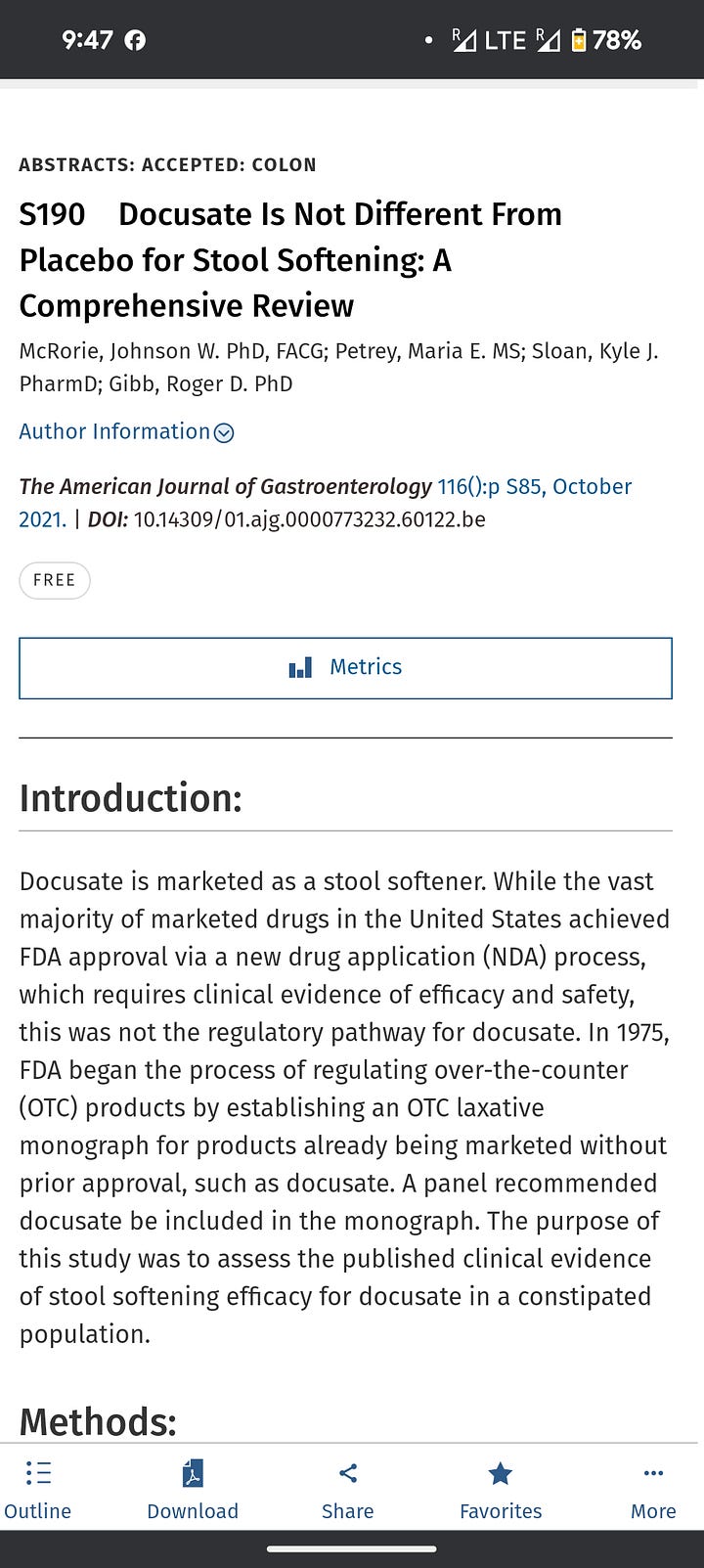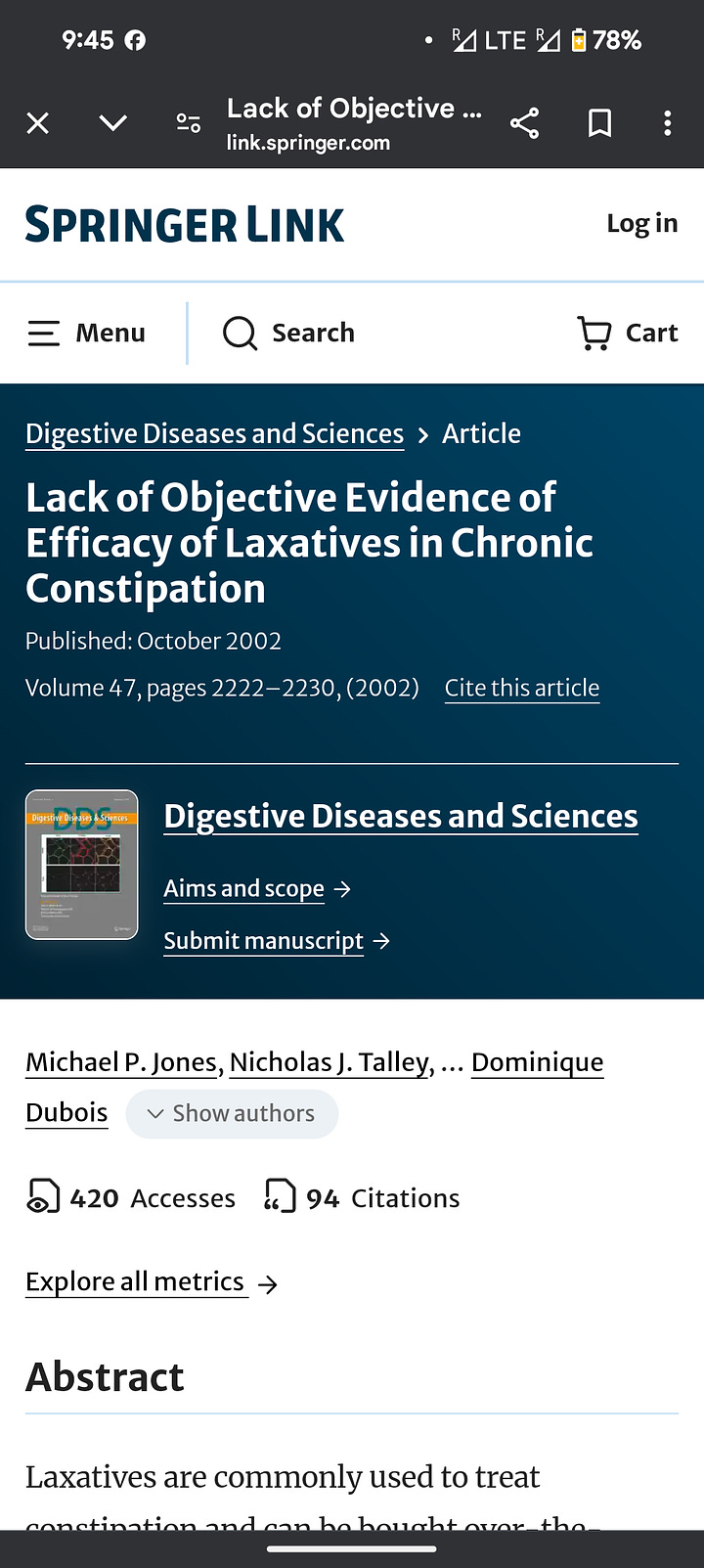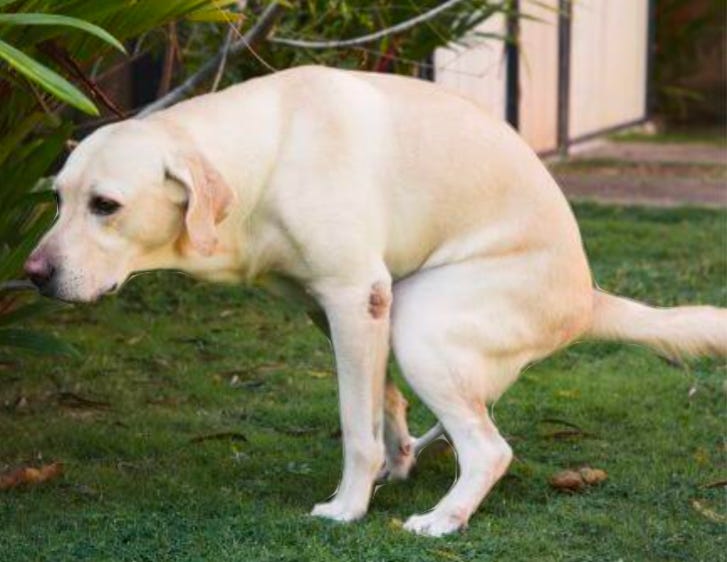Ask Dr Gary: Blocked Up
10% of people are blocked up. Most of it's preventable or treatable. For 40 years, we've had a better and safer treatment, but few have heard of it. Why are we still using the bad old medicine?
[Thanks for this reader question, the first of a series.
Feel free to drop me a line if you'd like to see something discussed.
All answers are for general medical education purpose for a wider audience only; they are never given as individual medical advice. See your GP for that.]
Blocked Up
Constipation, I want to say right off the bat, is mostly preventable with dietary changes.
The truth is our modern diets are a mess: highly processed, calorie-dense, with low residue and low fibre.
It's not surprising that approximately 10% of adults and children suffer from constipation.
What's surprising to me is that more of us aren't constipated, given the prevalence of our poor diets.
The key to not having rock hard pebbles most often comes down to two things: fibre and water.
Fibre particles are not easily broken down and they hold on to water, creating something like a colloid or suspension that gets incorporated into the poo, mixed up with it. The poo gets bulked up, and that's actually a good thing. Moist, bulky poo is much easier for the colon to handle.
The colon is the star of the show when it comes to constipation. Our bowels contain more nerve fibres than our brains. They literally have a mind of their own, with nerve centres in the gut managing digestion and peristalsis, the wave-like, snaking movement propelling food and stool using the concentric contractions of smooth muscle.
But to get a grip on stool, the colon requires it to be somewhat bulky, soft and wet. And yet the kind of food we eat leaves us with very little fibrous material reaching the rectum (the holding tank at the end of the colon just before the exit door of the anal sphincter), and what little does make it down is too often hard, dry residue devoid of the ability to hold water. Imagine trying to squeeze a tube of year-old toothpaste, but the toothpaste has dried in place.
The first goal of a patient, therefore is to increase the amount of soluble and insoluble fibre that they eat. Don't throw away edible peels, consume them. Start more meals with a piece of a raw vegetable. Aim to eat less meat and especially less starch (bread, potatoes, pasta). These things have almost no fibre. The don't bulk stool, and they don't hold onto water. A double whammy when it comes to your gut.
Even if you get a lot of fibre, you need to drink enough fluid to keep it hydrated. None of this 8 glasses a day gimmickry, just drink enough water to satisfy your thirst and keep your urine from getting dark.
If you don't pee all day, and when you do, it's the colour of black tea, you should probably up your intake of water. Not juice, not soda, not tea or coffee, but the healthiest choice: water.
If we could just do this: eat vegetables and drink water, I'm convinced we could eliminate most of the Western world’s suffering due to constipation. A little physical activity wouldn't hurt, either, in promoting bowel health and normal periatalsis.
But what if we do all this but still are passing pebbles?
Well, any good doctor would tell you that there are many causes of constipation to consider. Are you on opioid (painkillers) or other medications renowned for causing constipation? Do you have a guy dysmotility issue? Bowel surgeries or diverticulosis? Obviously, as an emergency doctor I would consider life-threatening causes as well: bowel obstructions due to surgical adhesions or rarely cancer, hypothyroidism, and other uncommon but shouldn’t-ignore causes.
But if you've worked through the causes, improved the diet, there’s one more thing to consider before you take any of the biggest-selling laxatives: colonic atony.
It is more common than you think to find people that have had chronic constipation for so long, and treated it with so many courses of harsh colon-flogging laxatives, that it just doesn't work well anymore. This is atony. A paralysis of colon peristalsis that can be caused by laxative overuse.
On the sides and in the walls of every centimetre of your colon is muscle — smooth muscle that has to be “kept in shape” through healthy food, with enough fibre to give it some grip, and enough water to give it some slip.
But what we see instead is an epidemic of diverticulosis and associated ills. A low fibre, low residue diet for a long enough period of time will give many people diverticulosis, a disease of the colon where bulges, pits, and outpouchings form in the bowel walls — small pits that accumulate stool, inflame, and even perforate. While there is a genetic influence on diverticulosis, the “western diet” takes the majority of the blame, with more than half of all Westerners over 60 years of age developing diverticular disease of the colon.
As we age and as the population ages we are seeing constipation reach levels that concern me. As we now know, gut health has an impact on cancer development, obesity, and in the case of constipation, even day-to-day comfort and productivity. Chronic constipation is painful and can ruin lives.
But what I still see is the management of constipation using products that will make constipation worse. A preventable harm that needs to be eliminated.
I'm not saying that there's no role for magnesium citrate, Fleets enemas, Microlax enemas, lactulose, coloxyl, or Dulcolax (bisacodyl). But what I am saying is that I would never preferentially choose *any* of these agents if I could choose a safer and usually more effective osmotic laxative called macrogol.
Macrogol, AKA polyethylene glycol, PEG, Molaxole, Miralax, Lax-sachets, Movicol, or Macrogol 3500/4000/6000.
Macrogol is a generic name, and likely isn't a name you’ve heard, which is a shame. Marketing for harsh irritant laxatives is rampant: everyone’s heard of Dulcolax, even though for 40 years there has been a better, safer alternative.
Macrogol is a powder that when mixed with water and drunk, forms a polymer gel.
Inside your gut, it keeps absorbing moisture and holds onto it as a gel, all the way through your intestines. It basically never dries out or gets hard. And it doesn't allow the stool to either.
It mixes with stool, bulking it up and hydrating it. And as we said above, a bulky and moist stool is the bee’s knees for treating constipation.
The body doesn't actually absorb macrogol, it just passes through. It doesn't appear to change the gut flora and mess with the microbiome. Unlike Kiwi Crush or Metamucil, macrogol doesn't contain sugar. The only common side effect can be bloating, or diarrhoea if you take too much.
Unlike all the irritant laxatives (Dulcolax and others), macrogol is a a relatively gentle osmotic laxative, meaning it doesn't affect the secretion of salt and sugars, or chemically irritate the nerves in the colon lining forcing the colon to peristalsis.
The biggest problem with irritant laxatives (ie, the most commonly sold laxatives on the world market) is that a repeatedly irritated gut eventually learns not to respond. And then you’ve got real (sometimes lasting and unmanageable) problems.




Macrogol was initially just used as a bowel prep to clean out the guts prior to colonoscopy. Patients were told to drink so much that their bowels would run clear like water, allowing them endoscopy camera to visualise polyps and cancers in an empty, pink, and clean colon.
But it was soon learned the macrogol could be taken in smaller amounts for acute constipation, and in even smaller amounts for maintenance of regular stools in people with chronic dysmotility issues. It proved safe even in children and the elderly, unlike irritant laxatives and enemas.
Over time, even though we learned other laxatives were unsafe or in some cases, ineffective, their use (and their for-profit sales) continued.
Particularly concerning were reports of renal failure and death in some elderly patients given repeated Fleets enemas, and some remarkable studies suggesting that one of the biggest selling laxatives worldwide might be ineffective: no better than a placebo (This was docusate, marketed as Dulcolax).
In short, due to force of habit, and lax marketing laws that allow unethical marketing practices, the world has remained in the thrall of ineffective and less safe medicines for constipation while more effective and safer alternatives exist.
The various gastroenterology societies have embraced the increased safety and efficacy of macrogol in their recommendations stations years ago, but uptake among clinicians is still slow.
There is little promotion of a medication that is generic and off-patent, available over-the-counter, and doesn't bring big profits. Only when pharmaceutical companies monkey with the formula, adding bells and whistles that, if anything, actually make the product worse, do they re-patent it and promote it.
This is yet another example of how our broken system of healthcare-for-profit actively prevents safer medicines and treatments from reaching us.
When profit is goal #1, the care of the patient always takes a back seat.
In the case of macrogol, it’s led to 40 years of bad medicine.
But hopeful those reading this can spread this info around. (Pun intended.) There’s a better, safer treatment for constipation.
Final word: it should go without saying that I have no interest in whatever companies make or sell macrogol, but nowadays you can't assume anything, so I'll state it. My only interest is in seeing scores of patients that were on less safe medications because they or their doctors didn't know any better, or were manipulated by 40 years of irritant laxative companies’ advertising.
Thanks for reading.
May all your poops be bulky and well-hydrated. 😄
-Dr Gary Payinda




Eat 2 kiwi fruit daily and you won’t have constipation, guaranteed!